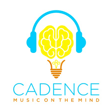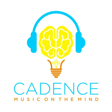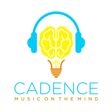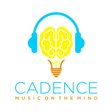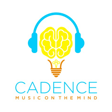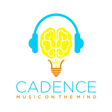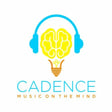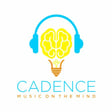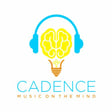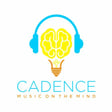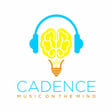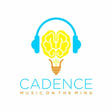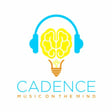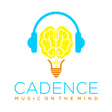Become a Creator today!Start creating today - Share your story with the world!
Start for free
00:00:00
00:00:01

S04 Episode 06: Connie Tomaino on Music Therapy for Stroke and Aphasia Pateints
In a special series within season 4, Indre speaks with Connie Tomaino, executive director and co-founder of the Institute for Music and Neurological Function (IMNF). This episode, Connie talks about how music therapy can benefit patients who have had a stroke and/or suffer from aphasia.
Cadence is the podcast where we talk about what music can tell us about the mind. Hosted by neuroscientist and musician, Dr. Indre Viskontas, the fourth season will bring you the stories of people who experience music outside the bounds of the average listener, and who use music as a tool to be heard in a society in which they are often ignored.
Transcript
Introduction to Unique Musical Experiences
00:00:10
Speaker
Welcome back to Cadence. This season on Cadence, we're telling the stories of people who experience music differently than the rest of us. Those who use music as a form of not only expression, but of communication, of a way to be heard by a society that ignores or outright silences them.
The Healing Power of Music Therapy
00:00:30
Speaker
We also want to explore the healing power of music by diving into the nuts and bolts of music therapy. In four special episodes this season, I chat with the legendary Connie Tomano, executive director and co-founder of the Institute for Music and Neurologic Function in New York.
00:00:49
Speaker
So far this season, we've talked to Connie about music's role in both the treatment for Parkinson's and for dementia. This episode, we're back with her to talk about another use case for music and medicine.
Connie Tomano's Insights on Music Therapy
00:01:01
Speaker
Do you remember the first patient that you saw who had aphasia, and maybe you wondered whether music therapy could help? Sure, there was a gentleman who had aphasia. He was in our adult daycare program, and he was being seen by the speech therapist. And the speech therapist thought it was really interesting that he could sing the beginning of Old Man River.
00:01:26
Speaker
just a couple of words, but couldn't say a word. And I had seen people who had aphasia, but I didn't have the opportunity to work with them really intensely. I did take him as a private client that I could work with. And I saw him a couple of times a week. We started by singing Old Man River.
00:01:46
Speaker
Eventually he was able to sing more of the words of the song successfully.
Patient Progress with Music Therapy
00:01:51
Speaker
And then as he did that, I had him recite the words without the music.
00:01:57
Speaker
And tap. I was familiar with melodic intonation therapy and the technique of tapping and sort of intoning words, but this was using a pre-learned song. And it seemed that the more he recovered the lyrics to the song, the more he was able to not only recite the words, but then be able to put together words in a new sentence.
00:02:20
Speaker
He was able to say things. He could never say two words together. In fact, most of the times he could just say yes or... But after working with him for quite some time, he was able to say, either if he asked him what he did for the week, and he says, oh, I saw my family. Wow. I went to church.
00:02:36
Speaker
We had a good time. So short sentences, but he would refuse to talk before. He wouldn't even try because he couldn't. And this wasn't a recent stroke. He had had a stroke 10 years prior to coming in. Wow. So that kind of recovery was still positive. Typically, if somebody has aphasia, they may recover a little bit, but not fluid speech. And obviously, this is so many years past, but the fact that he could now say words meaningfully immediately was an amazing recovery.
Understanding Aphasia and its Effects
00:03:03
Speaker
Aphasia is a term used to describe language dysfunctions, usually caused by a brain injury, a gunshot wound, for example, or a stroke or tumor. The type of aphasia that leads to speech problems is called Broca's aphasia, after the French neurologist who first published his observations that the brains of people with difficulties speaking often share a common feature, damage to a part of the left frontal lobe, now called Broca's area.
00:03:30
Speaker
These patients tend to have trouble getting words out, like the character Hodor in the Game of Thrones, who could only say his name, Hodor, Hodor, Hodor. What's really fascinating is that people with Broca's aphasia can still understand speech just fine, and even inflect the few words they can say with meaning. So Hodor can express his feelings to some extent with just that one utterance. Disappointment might be Hodor.
00:03:59
Speaker
Excitement or fear? Hoder. Hoder. Hoder. Of course, there's a limit to how much one can say with just one or a few words, and the patients are fully aware that there are other words they could use, but they just can't seem to get them out.
00:04:15
Speaker
Sometimes we all have a tip of the tongue phenomenon where we know the word that we're trying to get, but we can't really get at it. Do you have a sense that for people with this kind of Broca's aphasia, that that's what it's like, or is it a fundamentally different problem? Oh, that's a good question. I know I've had people tell me it's like that. For some people, they know that it's there and they're trying to find it. And for others, they say they just even can't think about it. So it's a little bit different, I think, for each person.
00:04:45
Speaker
So, aphasia patients have this frustrating inability to express themselves with words. And in the 1970s, a new kind of technique was developed to try to help patients recover their speech abilities. A key element of this new technique? Music.
Melodic Intonation Therapy Explained
00:05:02
Speaker
Melodic intonation therapy, what is it? Melodic intonation therapy was developed by a speech therapist and Helms and Spocks were the people who developed it and wrote about it. It's the use of two tones up and down and finger tapping in the rhythm of the syllables of the word.
00:05:23
Speaker
There's a very strong connection between motor function and speech. So the tapping drives the motor area or excites the motor area, which I believe then influences excitement of areas where speech can be affected. And I think there has been some research that shows that there's such a close connection. I think that's why melodic intonation therapy is really dependent on the tapping.
00:05:46
Speaker
Do you think that there's more or less importance of melody versus rhythm in this kind of technique or are they equally important? I think in this case there may be some current research going on because this has been a question scientists have been curious about. It's probably more the rhythm than because of the motor implications of that and the motor system's exciting peripheral speech areas into action. Now it depends because the two-tone actually relies on some of the tonal
00:06:16
Speaker
and emotional aspects of speech that are dominant on the right side of the brain, which for people with non-fluidonephasia, it's the left side that's damaged and the right side that's still functional. And that's why people can sing rather than speak because that melodic part of their brain is still functioning.
00:06:38
Speaker
So Connie here is talking about non-fluent aphasia as opposed to fluent aphasia. The difference between the two essentially is that in non-fluent aphasia, the patient's speech is halting, effortful, one word at a time, like the Hodar example I gave earlier.
00:06:55
Speaker
Fluentaphasia is something else. It's often called Wernicke's aphasia after now the German neurologist who discovered that when a part of the brain in the left temporal lobe, near the ears and the hearing areas of the brain, when that area is damaged, patients seem to be able to speak just fine, but they're not understanding what others are saying, and their own speech doesn't make a lot of sense to us.
00:07:20
Speaker
We sometimes call their speech patterns word salad, because while it might have the right grammatical structure or tone or prosody, the words are all jumbled up, like a bunch of randomly tossed ingredients in a salad. It's a different set of brain regions and a different set of symptoms, and melodic intonation therapy isn't the right tool for those patients.
Effectiveness for Non-Fluent Aphasia
00:07:45
Speaker
But for people with non-fluidophasia, whose brain injury is in the left frontal lobe, who can understand what others are saying perfectly well, and who know what it is they want to say, but can't, that's where melodic intonation therapy is particularly effective.
00:08:03
Speaker
and we even know why. It turns out that there's a tract of fibers, connections, between vernocles and Broca's areas that take messages from the speech comprehension regions and send them to the speech production regions so that the person can respond appropriately to what they're hearing.
00:08:24
Speaker
For most of us, whose language functions are primarily driven by the left side of the brain, this fiber tract is like an eight-lane highway with messages going back and forth in droves. It's called the arcuate fasciculus. Say that ten times fast.
00:08:41
Speaker
Now, we have a similar tract or set of connections in the right hemisphere. But unless you're a musician, that tract is more like a country road than a super highway. Because we just don't use it as much. Musicians, however, do use it, since they take what they hear and turn it into a musical expression, and that ability is more tied to the right hemisphere than the left.
00:09:06
Speaker
Well, with melodic intonation therapy, patients learn to rely more on the right arcuate fasciculus, singing what they want to say. And guess what?
Research on Brain Plasticity and Therapy
00:09:18
Speaker
Music actually rewires their brains.
00:09:24
Speaker
You're probably familiar with this, but there's this great paper from Gottfried Schlaug's lab showing the impact of melodic intonation therapy on that. You want to talk about that paper or those findings? I think it's the one you're talking about. They had like 10 months of intensive. Yeah.
00:09:39
Speaker
And they show, like, bigger white matter tracks in the arcuate fascicula? Fasciculus. Yeah. Yeah. OK. So tell us about that one. Well, for me, it was the most exciting thing to see because it actually showed the neuroplasticity of the brain, where there's this obviously gaping hole, like, the loss of the whole arcuate fasciculus on the left in somebody who had a massive stroke and was severely aphasic, but who gained communication skills back
00:10:07
Speaker
And when they did a follow-up brain scan, they showed the enhancement, like the enrichment of fibers in the accurate fasciculus on the right. And that network is something that connects the temporal lobe and the motor areas of the brain. And so the enrichment of that after intensive melodic intonation therapy actually gave scientific proof that not only did the person recover function, but that brain actually changed that, allowed that function to stay.
00:10:33
Speaker
Yeah, it's music literally rewiring the brain in a way that we can measure and see. And one of the reasons that I find that evidence really compelling is that when you look at musicians, instrumentalists tend to have a thicker arcuate fasciculus on the right than non-musicians, and singers have a thicker on both sides, which makes a lot of sense if you think about what they're training themselves to do.
00:10:57
Speaker
Absolutely. And I think even people who have melodic languages, like Asian languages, also have enriched archivisicals on the right.
00:11:06
Speaker
There's melodic intonation therapy, primarily an English language tool. This kind of therapy has been used in other languages and cultures, too. That's a good question. I mean, it was developed as an English language tool in the United States, but the principles of it could be applied to other languages, of course. It all has to do with the natural rhythm of that language's beat or whatever cadence of that natural language that the rhythm would have to reinforce.
00:11:34
Speaker
Is there any evidence that people who speak tonal languages are less likely to have a Broca's aphasia? Off the top of my head I can't say that but I'd heard people discuss it and I'm pretty sure if we looked it up this probably the Asian speakers probably have less incidence of Broca's aphasia. But then if they had the right side stroke I would be curious about what their loss would be.
00:11:56
Speaker
That's right, because yeah, maybe then they would speak, but they wouldn't have the tones, which means they wouldn't have their full speech. Right. And the words would mean something different. Yeah. Without the tones. As I mentioned earlier, not all cases of aphasia are compatible with melodic intonation therapy, which raises the question, how can I tell if melodic intonation therapy is helpful for any given patient?
00:12:21
Speaker
Well, as it turns out, music is the key at this juncture as well. If you had to give advice to a newly minted music therapist who doesn't have a lot of experience in order to assess whether a person might benefit from music therapy, how would you train them to make that assessment? Sure. Well, doing assessments is part of music therapy training. One is if they could tap and sing Happy Birthday.
00:12:46
Speaker
And so if they're tapping in rhythm with the words appropriately and if they're able to get, doesn't even have to be 100% of happy birthday, it could be just a couple of the words within tone and correct. So it's the right word so they can sing happy birthday to you. Just that alone is a positive assessment for the potential that music therapy could help.
00:13:08
Speaker
I remember one time we had a conversation where you were talking about how some of these tools to assess a person's musical ability could be diagnostic. This is definitely one of those cases. Just because of so many people that we've seen, clients that we've worked with, if that murder area has been damaged, and I think it's because there might be a stroke that actually is a little bit further in the frontal area that actually affects the murder strip, that those people tend not to recover.
00:13:37
Speaker
So that's something that I used to use and Oliver used to as a diagnostic tool, whether this person could benefit.
00:13:44
Speaker
For aphasia patients who can benefit from melodic intonation therapy though,
Emotional Impact of Singing on Therapy
00:13:48
Speaker
studies have shown that significant recovery in speech ability is possible. What that recovery looks like can depend on a lot of factors. So in this next part of the conversation, Connie discusses some of the different contingencies and complexities that can arise when implementing melodic intonation therapy in practice.
00:14:08
Speaker
I wonder if you could talk a little bit about the emotional side. So I know that for me sometimes if I'm going through a stressful situation or experiencing a loss, sometimes it can be hard to sing without crying. It immediately brings up all of these emotions to the surface. You literally get
00:14:27
Speaker
stuck in your throat. So there's obviously this deep connection between singing and our emotional responses. Can you talk a little bit about that side of things and when it can be helpful in terms of motivating a person and when it might get in the way? Sure.
00:14:42
Speaker
There's actually a couple of things to be mindful of because some people who have strokes will cry automatically just because the inhibition of crying has been, I won't say damaged, but has been altered. And so as soon as they start singing, first it's this overwhelming thing, my goodness, I can sing, I can make sounds with my voice and use words. So that's a surprise. So they may get very emotional in the fact that they're just happy and surprised that they could do it.
00:15:10
Speaker
But sometimes they just cry as soon as they start making the sound. And I think that has to do more with a neurological issue of a disinhibition of crying. But then there's a couple of things we could do. We can actually work with their emotions and sadness. And that's more from a psychotherapeutic point of view that may have nothing to do with speech.
00:15:31
Speaker
What you're describing to hear underlines how important it is for, in this case, the music therapist to have this psychotherapeutic training to be able to manage the person's emotional journey here. Because I can imagine, and I don't know, maybe speech therapists also have a similar training, but it seems like that that could be a really critical piece of whether or not this is successful.
00:15:55
Speaker
The challenge here is that if you're helping the person express themselves non-verbally, express themselves emotionally through non-verbal meaning, through sounds or sighs or vocal improvisations, that's completely different than helping them with communication skills.
00:16:11
Speaker
And you have to be very careful not to confuse the two or combine the two, because if you're doing a repetitive type exercise to retrain the brain like Godfrey Chlogg's paper shows, that has to be a very strict protocol that uses and reinforces a similar technique that gets repeated over and over again.
00:16:30
Speaker
So that person's brain can change and adapt and grow new networks. If you're interspersing that with some kind of emotional expressive type therapy, that's going to interfere with this subcognitive automatic skill set that you want that person to attain. So the music therapist has to be very careful about what their approach is going to be and when to do one other than the other. So if a person's very depressed and unmotivated,
00:16:58
Speaker
maybe working on the feelings first may help get them motivated to try. And sometimes it's just the opposite. Just focus on the singing if they could do it. Encourage them by saying, look how much you've accomplished, look how much better you're doing. And that usually helps them gain the confidence that this is possible.
00:17:21
Speaker
Is melodic intonation therapy something that a speech therapist can do, or is it really important that it be conducted by a music therapist? Melodic intonation therapy is under the speech language pathologist's scope of practice. I think music therapists, they're not specifically taught that technique. They're taught to use different kinds of singing interventions and things like that.
00:17:45
Speaker
In neurologic music therapy, there is more of an emphasis on the techniques related to melodic intonation therapy. So I think it depends on the training of the music therapist and their experience with these techniques to be able to use it.
Collaboration Between Music and Speech Therapists
00:18:00
Speaker
And it's really advisable that any music therapist who's working with a person with aphasia is in contact with that person's speech-language pathologist.
00:18:08
Speaker
and working towards similar goals and helping reinforce those goals because the consistency is really important. Most of the people that I've seen over the years have been people who were discontinued from speech therapy because they were no longer covered and maybe they plateaued to some degree.
00:18:25
Speaker
But there was still the possibility of them regaining some ability to initiate and to use phrases in the context of more of a singing type intervention than the strict and melodic intonation therapy. So music therapy may use different approaches.
00:18:41
Speaker
You mentioned in an adult daycare setting, not so much a rehab hospital. Can you talk a little bit about what the potential is there and what you look for to see if a person might be a good candidate? Sure. Adult daycare programs can be medically oriented, so they may be able to get some rehab as part of the day treatment, but mostly the social day programs.
00:19:02
Speaker
For people who aren't actively part of a rehab setting, obviously they're not getting consistent rehab. These programs just maintain whatever skills they have, and there's still possibilities of improvement. So when I see somebody, and we actually in our facility here have two or three people in adult day care who have aphasia, those individuals, when I am aware that they're there and when they start participating, the motivation is just unbelievable because they didn't expect that they could recover anything.
00:19:32
Speaker
And I think it's important to educate people who manage these clinics. There's case managers and social workers and others who work with people who have different kinds of neurologic deficits. They may not be aware of all the options they have for treatment. And I think the more information we provide and the more good research that supports the efficacy of these interventions, the more likely people will be able to get access to it. Great.
00:19:59
Speaker
Any last thoughts about what the future of this, not treatment, but rehabilitation for aphasia might lead us?
00:20:09
Speaker
I would really love if insurance companies and the powers that be would recognize this as an important intervention for people with stroke. Because people with aphasia end up having challenges with jobs and other types of things that impact the economy, that impact their life. Being able to get them to recover as much as possible is something that would have benefits not only for them individually, but would actually carry over to other aspects of work and life.
00:20:36
Speaker
I just hope the message gets out there. There's enough research that supports it at this point, so it's just a matter of getting the support to the people who can really use it. And there are a lot of people who could really use this sort of support.
00:20:49
Speaker
It's not just strokes and tumors and traumatic brain injury that can cause aphasia. There are nerve-degenerative diseases as well. Recently, Bruce Willis was diagnosed with aphasia, but of course he's not alone. According to the National Aphasia Association, about a third of all strokes result in some form of aphasia. Over a million Americans are suffering with it, and some estimates even put that number over two million.
00:21:17
Speaker
And since age is a major risk factor, particularly of neurodegenerative diseases, and our population is getting older demographically, it's only going to become more common. So for those of us looking for some actionable information on the topic of music and aphasia, we'll throw it back to Connie to end the episode.
00:21:38
Speaker
Okay, so now we're at the part in the episode where you give us some tips. So if someone has a loved one with aphasia, what can they do to find help?
Resources for Finding Certified Therapists
00:21:48
Speaker
And if people want to find a neurologic music therapist in particular, is there anywhere that they can go to figure out who they might find in their own area?
00:21:57
Speaker
Sure, there's an academy of neurologic music therapists that does have a listing of people who've been certified by them, and they should check with them first. And one of the things I always suggest is to see if they could tap and sing, happy birthday. And if they could do that, at least with some success, to find some songs that they used to know really well, could be any popular song, whatever. And even if they don't know all the lyrics currently, they should try to sing as much as they can every day. That's on.
00:22:27
Speaker
And the person who's taking care of them for with them to have them tap along with that and see how much better they can do. You can also sing and tap so if like melodic intonation therapy encourage them to try to sing phrases like I need a coat.
00:22:45
Speaker
I need a coat. But for the caregiver, care partner too alters talk like that. So then this becomes like a habituated way of communicating that then encourages the person who had the stroke to consistently use that sort of sing-song type of rhythmic speech. And that seems to help a lot.
00:23:01
Speaker
So many social signals that speech give that are subtle. And I can imagine that a person who can only sing a phrase might feel embarrassed that they need to sing it rather than say it. But if everyone around them is using that technique, I can see how that would make the person feel more comfortable and be able to do it. That's really interesting. And the success is possible. So it's the consistency and the encouragement that needs to be there.
Podcast Credits and Contact Information
00:23:31
Speaker
Season 4 of Cadence is created by me, Dr. Andre Viscontes. It is produced by Ireland Meacham and Matthew Rubenstein at Audiation. It is mixed by Matt Noble with music from Rian Sheehan from his album Stories from Elsewhere. You can find us online at cadence.show. You can also get in touch with us at cadencemind at gmail.com. You can find me on Twitter at Andre This. Cadence is generously supported by the Germanicos Foundation.
00:24:07
Speaker
Audiation
